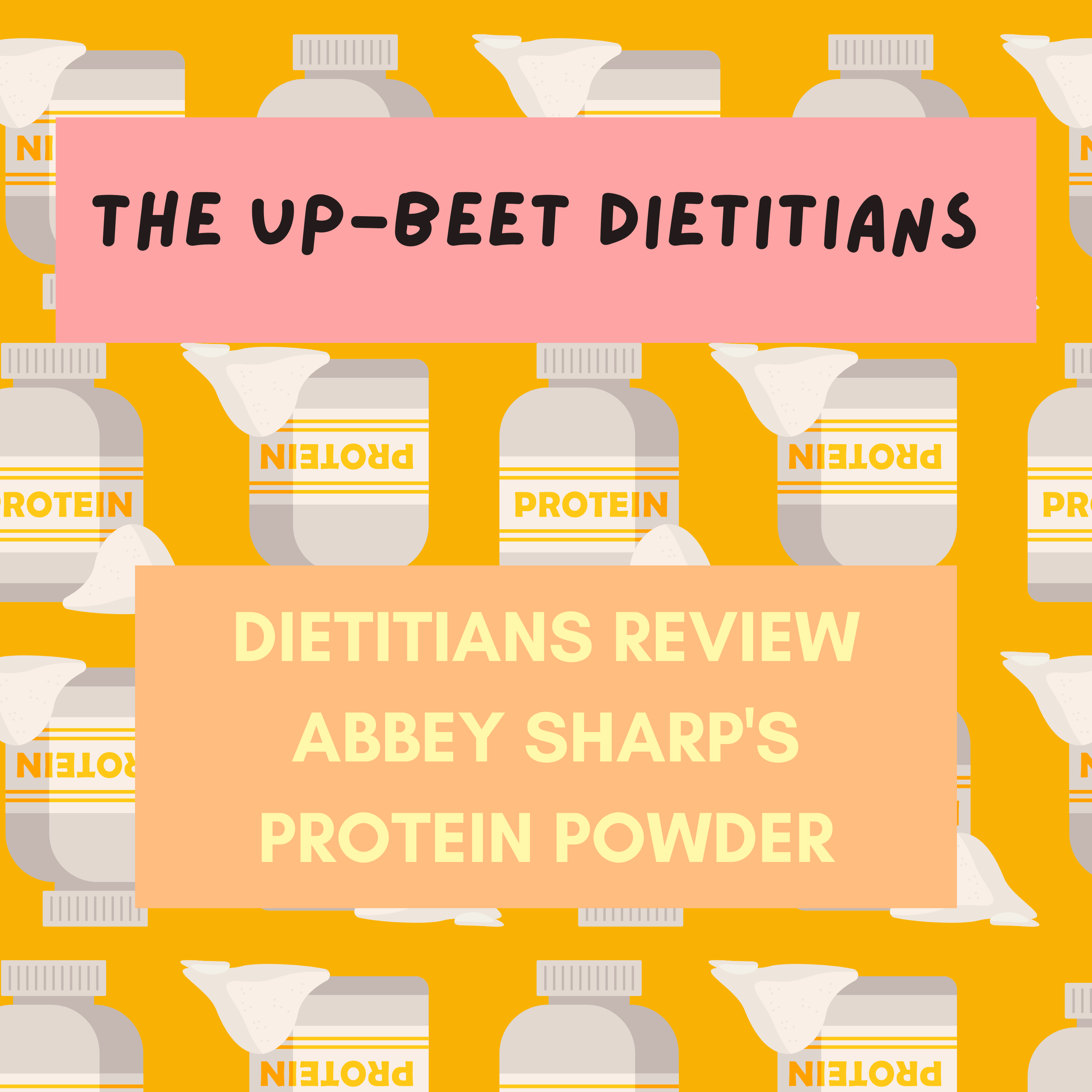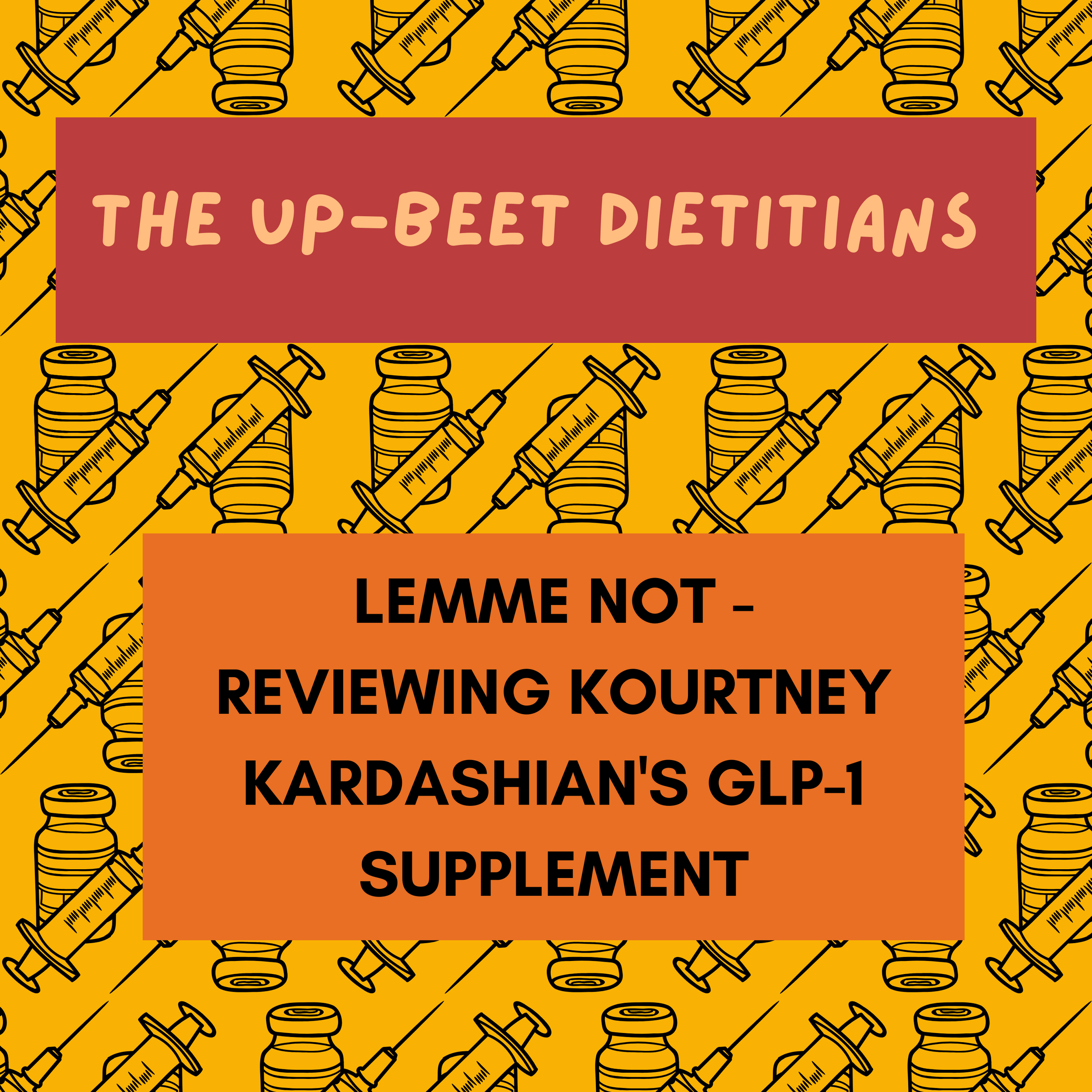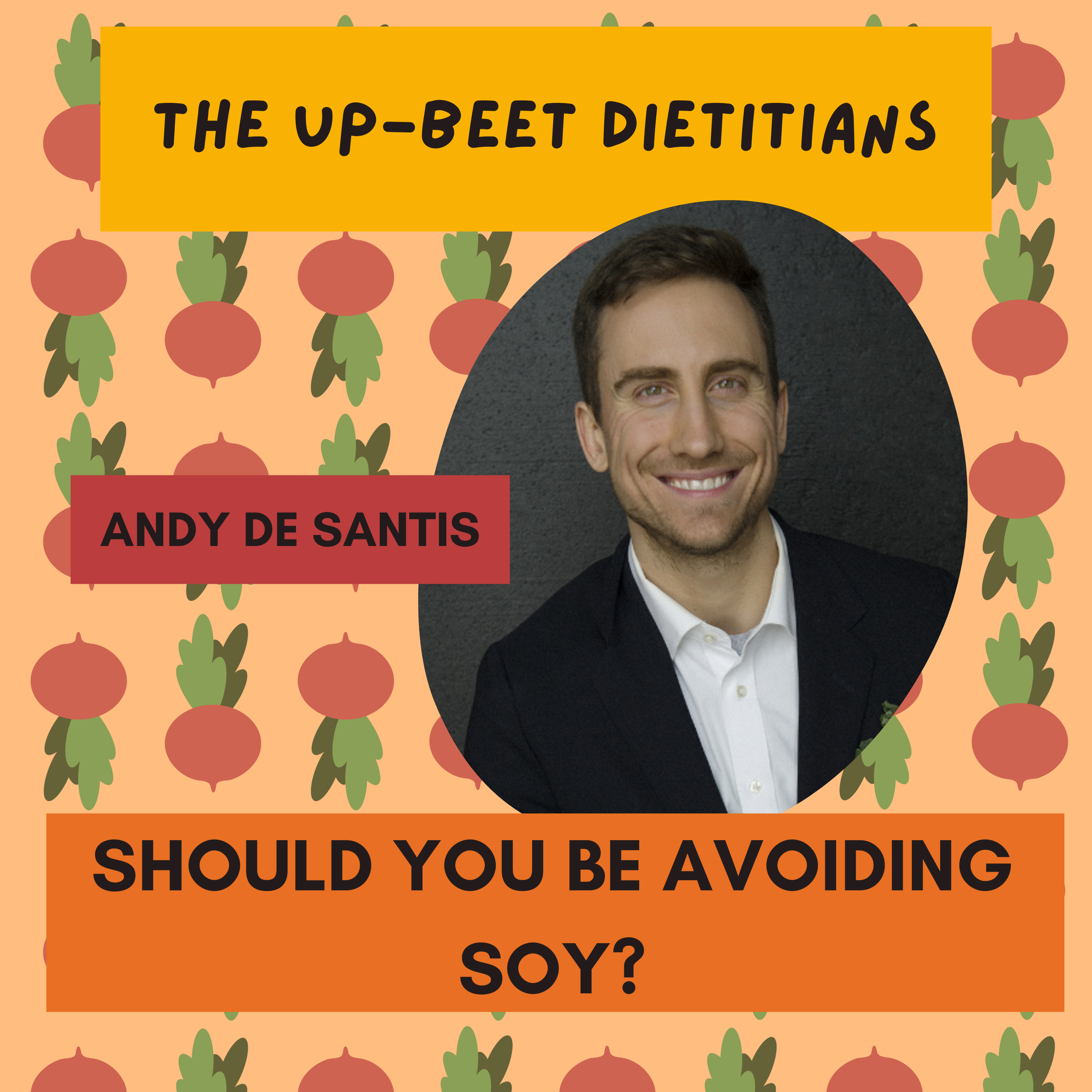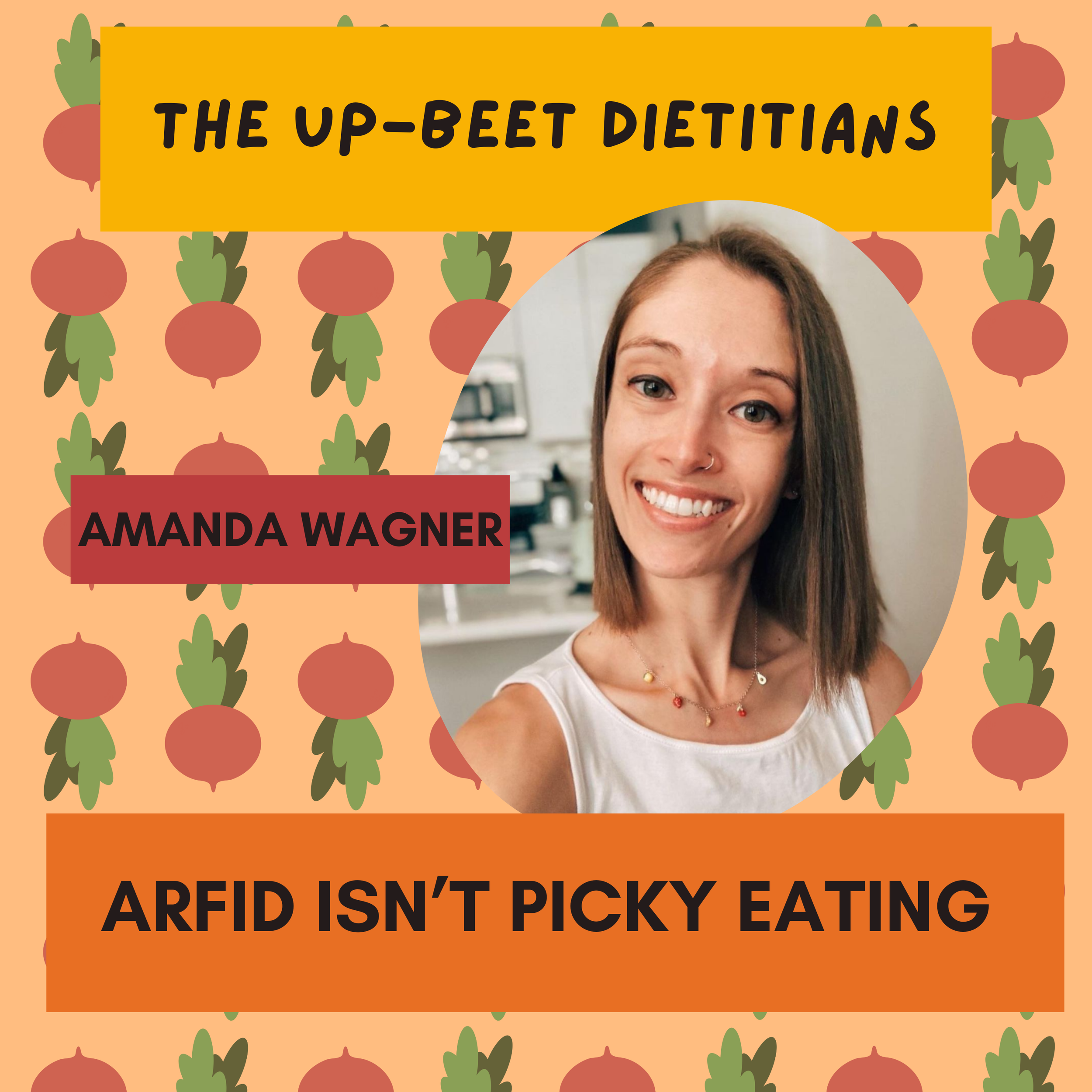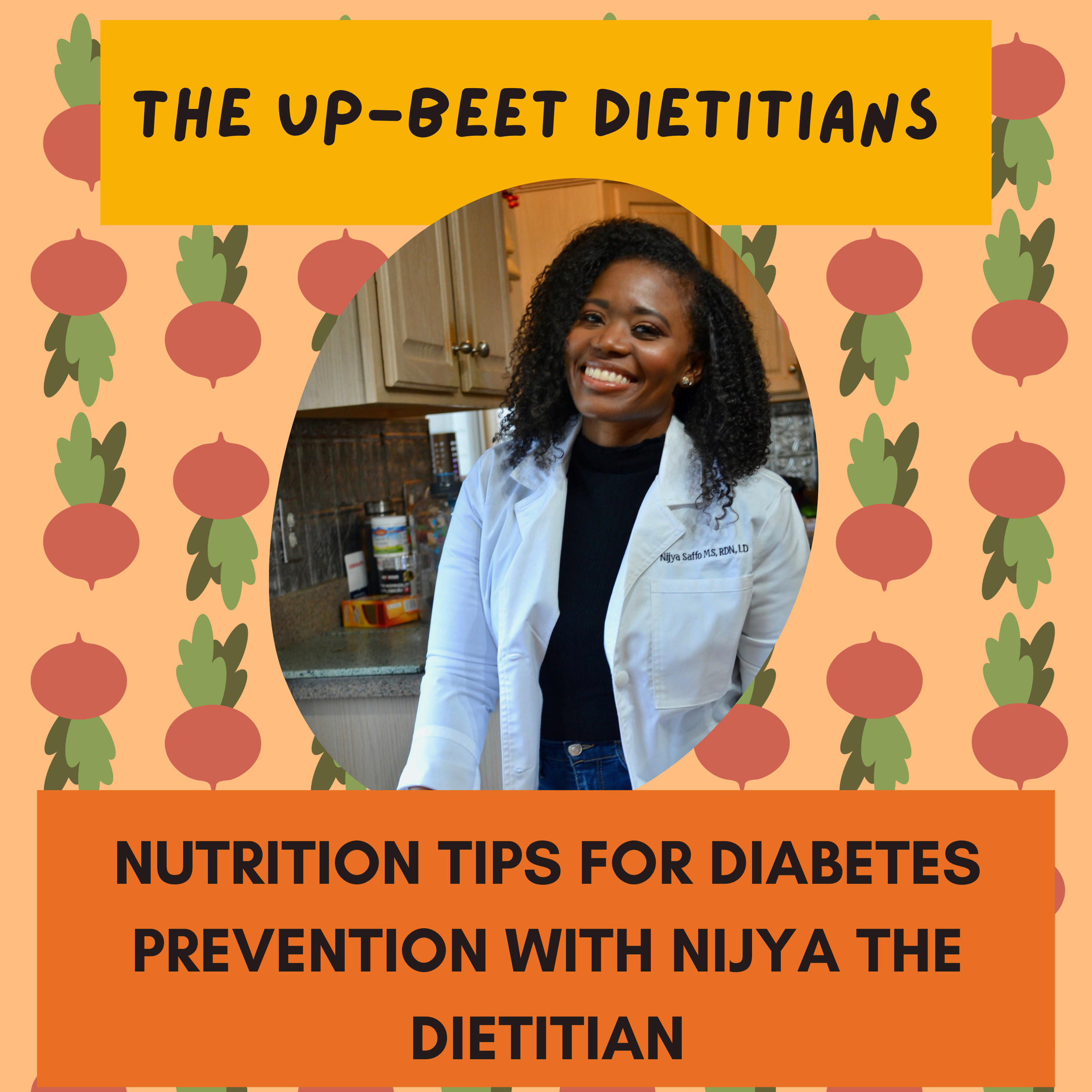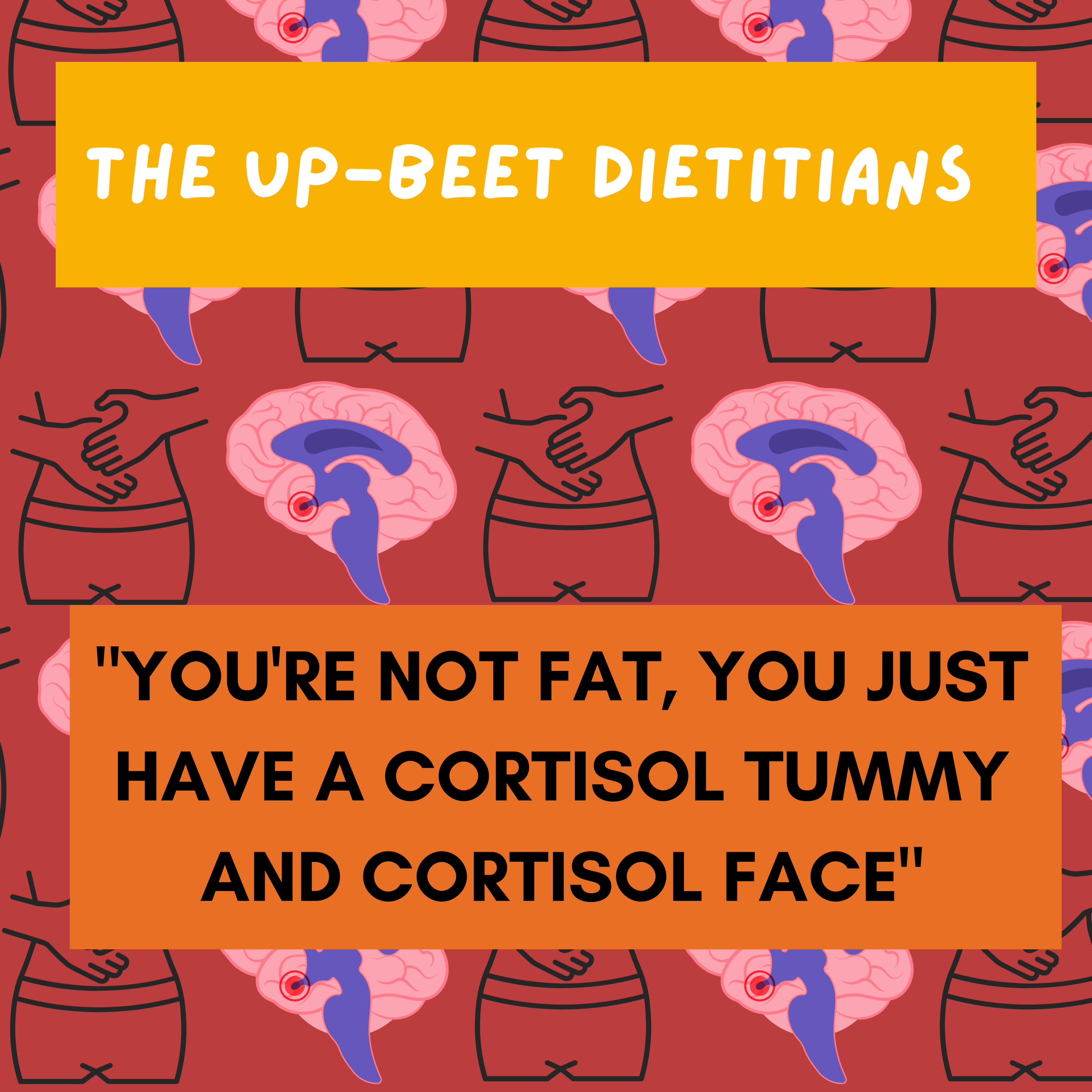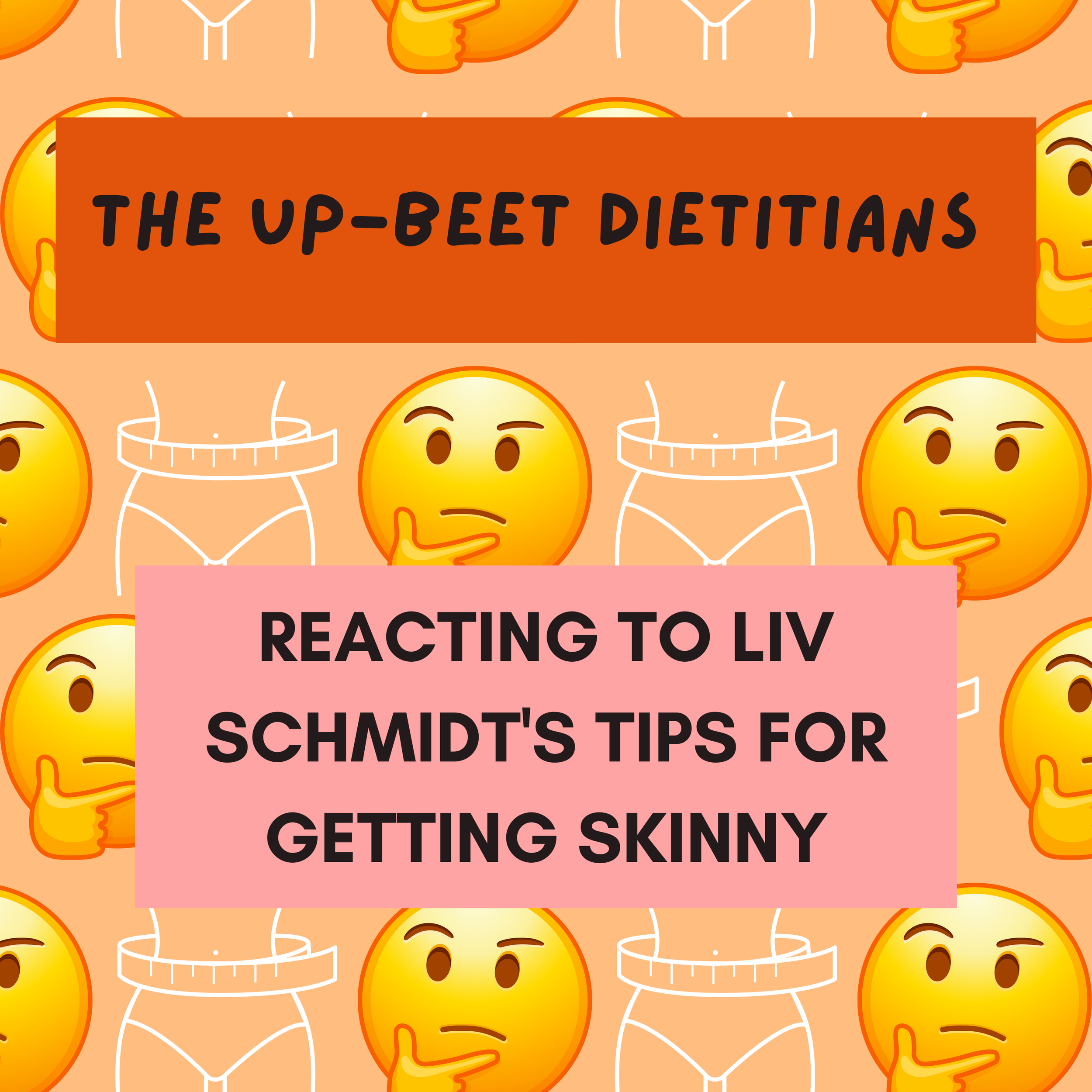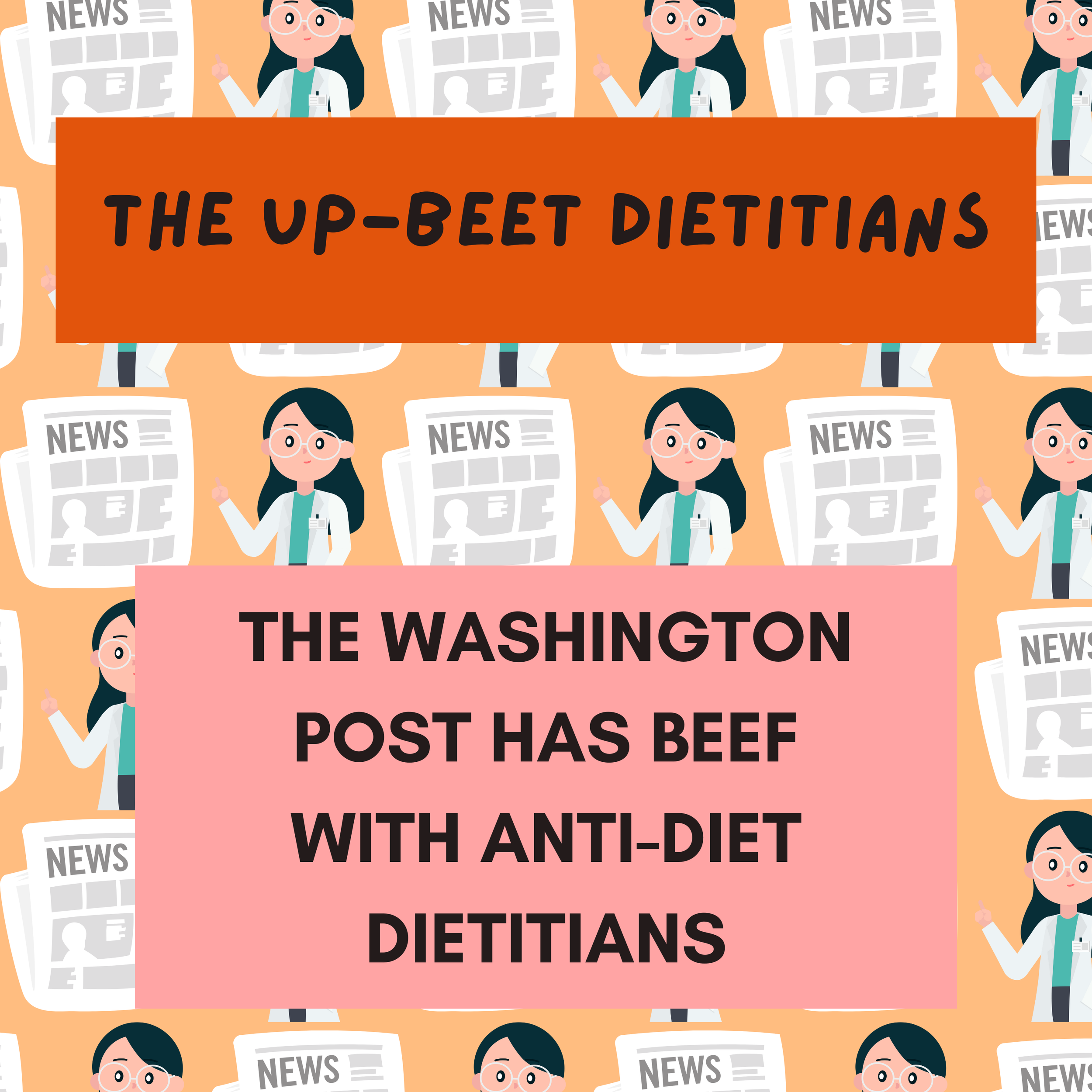Episode 148: Gut Health Dietitian Comments on Leaky Gut and the Poppi Lawsuit w/ the Inclusive IBS Dietitian (Samina Qureshi)
Listen to the episode
Watch on YouTube
Episode Description
In this episode of The Up-Beet Dietitians podcast, Emily and Hannah are joined again by Samina Qureshi. Samina previously came on the podcast to discuss IBS and the validity of food sensitivity testing. This episode Samina discusses leaky gut, how to fix leaky gut, if you should be taking a prebiotic or probiotic, and her thoughts on the Poppi Lawsuit. Be sure to tune in for all things gut health!
Samina Qureshi RDN, LD is the founder and Registered Dietitian at Wholesome Start, LLC a weight-inclusive GI nutrition practice based in Houston, Texas. She specializes in helping people who struggle with Irritable Bowel Syndrome (IBS) find relief and nourish their bodies without rigid diets, stress, guilt, or shame. Samina respects body diversity and encourages her clients to care for their health in a gentle way that best honors their lifestyle, unique needs, and cultural traditions. Through nutrition coaching, her clients are able to heal their relationship with food, find relief from their uncomfortable gut symptoms, and support long-term gut health.
Work with Samina:
Instagram: @inclusive.ibs.dietitian
Website: www.wholesomestart.com
Tune in on Spotify, Apple Podcasts, or YouTube to listen.
-
0:08
Hi guys, welcome back to the podcast.
We have brought back an amazing guest today for today's episode, Samina Qureshi.
You might recall from a few episodes back talking all about IBS.
Samina is the founder and Rd. at Wholesome Star LLC await inclusive GI nutrition practice in Houston, TX.
0:28
She specializes in helping people who struggle with Irritable bowel Syndrome, IBS find relief and nurse their bodies without rigid diets, stress, guilt or shame.
Samina respects body diversity and encourages her clients to care for their health in a gentle way that best honors their lifestyle, unique needs, and cultural traditions.
0:47
Through nutrition coaching, her clients are able to heal their relationship with food, find relief from their uncomfortable gut symptoms, and support long term gut health.
We are so excited for today's episode.
Enjoy.
Samina, welcome back to the podcast.
We're so glad you're here.
1:04
Thank you for having me again.
We are so excited we there's so many things we want to talk about with you, but there's only so much time.
So we had to bring you back on as quickly as possible.
And people know we're talking about Leaky Gut today and I'm so excited to hear your thoughts.
1:23
We're also going to talk about some other topics, but Leaky Gut's going to be the show, the star of the show today and we cannot wait to hear what you have to say.
But before we get into everything, I know we like just had you on two seasons ago, but your life has changed since then.
1:44
So we would love to hear an updated day in the life from you, what that kind of looks like.
Right, you guys, it has been nuts, OK, I have a new baby.
My second baby is four months old now and so I'm just now getting out of what we like to call the postpartum fog, where you're just like survival mode.
2:07
But now I'm in survival mode and I'm working, so it's with two kids.
So it's great.
I have a supportive family and an amazing nanny that all my money's going to.
Everybody will bet, I'm sure.
2:25
Yeah, and so a day in the life for me is waking up, checking to see who I'm working with.
Today.
I do in my private practice work with people who are struggling with IBS.
And so I'm still supporting people there, working with them one-on-one and and helping them expand their diet, overcome food fears with all of their gut issues and feel their best.
2:47
Perfect segue as always into our topic of the day.
Being in IBSI.
Don't want to say guru.
I feel like guru is discriminatory when it comes to being a dietitian.
But being in the niche of IBS, you're the perfect guest for us to discuss this with.
3:03
Let's get right into the talk about leaky gut.
So like this term, it gets thrown around all the time in the gut health.
I know Wellness culture has really Co opted like all of gut health, but we'll we'll start with like what exactly even is like giga?
3:19
Is it like a real things?
I've heard like people say that it's not even like a real thing.
Give us all the deets about what exactly like he got is or isn't.
Yeah, yeah.
I mean, I think it really comes down to like which rule of medicine you're coming from?
3:35
Are you coming from the functional realm of things or the conventional side of medicine?
Conventional side of medicine is like, you know, what if you're experiencing symptoms of leaky gut, which is, you know, possibly the diarrhea, digestive discomfort, gas, bloating, Constipation, all of the symptoms, pain, cramping and also experiencing, you know, possible other autoimmune conditions.
3:58
Maybe you have leaky gut, but maybe you have some other like functional or structural disorder that could be going on that needs to be further assessed by APCP primary care physician or your GI doctor, right?
And so you know, leaky gut is a syndrome, meaning a collection of symptoms.
4:16
It's a medical condition characterized by intestinal permeability.
And what that means is that the intestinal lining, right, the barrier somehow gets opened or disrupted, allowing the passage of possibly undigested food or food particles that are too big to pass through and either entering the bloodstream or other areas of the body that can be very dangerous, right?
4:41
We don't want you to have intestinal permeability or leaky gut.
The question is, is this a real thing or are you struggling with something else and food intolerances that can be addressed in a different way?
That makes sense.
I feel like that was such a good diplomatic answer.
5:00
Diplomatic's a very good way to put it, yes.
Like, yeah, like, kind of like looking at it not as like black and white, but what might actually be going on.
5:16
Like if there are different causes and the the causes can range as well.
Do people come to you for a leaky gut?
You know, I think so.
No.
Short answer, no, people don't specifically come to see me for a leaky gut.
5:34
However, it is something that they report in their symptoms.
So they're coming to me for IBS like symptoms or something wrong with their GI system.
Bloating, cramping, abdominal pain, distension, right diarrhea, Constipation, acid reflux, maybe even slowed motility.
5:56
Some people have seen like naturopathic doctors or functional medicine doctors who use this term leaky gut, tune, duck, leaky gut too describe like a slew of these symptoms right?
Like the syndrome and so that that term may come across in their intake form and as I talked to them, but what we're working on primarily is really understanding possibly the root cause of what she, what they are experiencing.
6:21
I, I work primarily with women.
So I was imagining someone coming to me, working with me for that issue.
So short.
No, they don't necessarily come to me for leaky gut, but I have seen it in my practice.
OK.
I'm curious because you 2 both have a history working in functional medicine.
6:42
What is your history like there?
Like in general or like leaky gut?
Did you guys treat leaky gut at all when you were in functional medicine specifically?
I'll go first.
I didn't really as much interestingly, I think there was a lot, there was a lot of other gut related things we were focusing on, but it was never like advertised as like or I was told by a functional medicine doctor work on their leaky.
7:13
Gut.
As much it was more like symptom management.
What like treatment would you do as a dietitian for that in that practice?
Low FODMAP is always my go to.
What would the other providers maybe recommend to weren't as like maybe on the outs of functional medicine like you were?
7:36
Smena, I don't know what you have seen.
I've seen a a wide variety bound to hear from you.
Yeah.
Yeah, Yeah.
I'd love to kind of chime in.
So I've never really kind of just like what Emily was kind of talking about.
People don't necessarily come in for like leaky gut, but some a doctor, some people say they have like leaky gut tendencies or symptoms and like things like that.
8:00
So then we address things I I did a functional nutrition like training and in that program they you know had a lot of different protocols for this.
And one thing that was demonized always and all of the education I received, which I know now is not necessarily valid is the elimination of gluten to me unnecessarily.
8:25
And so often times people will think they have like a reactivity to gluten, whether it be non celiac gluten sensitivity, which is absolutely a real thing or celiac disease, right, where we need to eliminate gluten to lower inflammation in the body and really manage that damage that is caused by the protein gluten when you consume it to our villi in our intestines.
8:50
However, in this training, if someone came in with like the slew of symptoms and they were very inflamed, also inflamed is, is more of like a symptom versus like anything we were actually testing, right?
9:07
It was like, oh, I'm just like feel inflamed.
I'm inflamed.
I, I, I feel like my intestines are inflamed.
That was always something that people said, but there was never like a test or something.
These people didn't have inflammatory bowel disease, you know, And so right off the bat, gluten free was recommended because apparently gluten breaks down the intestinal lining and causes you to have a leaky gut is what.
9:34
A school according to this practice, Yeah, Yes.
Interesting.
Did you experience the same thing?
Was that the same line of thought?
Yeah, I feel like the big three that always got eliminated were gluten, dairy and then soy.
9:51
Yeah.
Those are like which made it very challenging.
Those are everything, yeah.
Definitely in everything.
And I feel like, you know, when you work with people, it's so easy for them to get scared of these ingredients, right?
10:13
Like these things in food and become hyper vigilant about like reading ingredients and nutrition labels and like, Oh no, it's a whole thing.
And so like in functional medicine, a really big like, trigger for a leaky gut, right, is stress.
10:32
But for some reason, you know, they're OK with shoving elimination diets down people's throats, which cause a crap ton of stress.
Like you are going to be stressed if someone tells you that a food is causing your body harm.
10:51
You're going to be hyper vigilant about never eating that again.
Exactly that.
I feel like I don't have the personal experience or professional and functional medicine, but I feel like the concept of like nutrition by addition and like food freedom, so to speak, whatever you want to call those practices, I feel like those those just don't exist in the functional medicine world from what I've seen.
11:15
Yeah, often is like take away.
Yeah, absolutely, absolutely.
And when I would like push back, I would be like, why don't we focus on adding things in?
Like there's so many things that we can focus on.
But yeah, it's it's almost like they like to put blame on the person or not doing what they're supposed to and therefore they're continuing to have the symptoms and you must have done something wrong.
11:42
So that's why you don't feel better, you know, And it's like.
It's net totally like.
So it's it's not cute.
Not.
Cute, not fine and cute.
No, no.
12:00
I feel like we kind of talked about the next question is like the how to fix leaky gut you.
I mean, I was like you talked about like figuring out what is actually causing these symptoms and looking into the root cause.
Yeah, absolutely.
And to a certain extent, I would say like one thing I took away from functional nutrition practice is looking at the person as a whole, right?
12:22
Really addressing in my practice, I'm always addressing like sleep hygiene, stress management, gentle movement, inclusion of foods and hydration, right?
And so with this, the process of really understanding the root cause comes from listening and learning from the patient.
12:39
And I think that's something that we can like value in conventional nutrition practices.
And so when you're trying to address leaky gut from a functional nutrition approach, it is, you know, one, what can we take out that could be potentially triggering this response in your body?
12:59
And then looking at, you know, stress responses, possible environmental toxins in that program they talk about like stressful relationships, your relationship with food, pollution, etcetera.
And then also like the, if necessary, addition of like supplements or probiotics or whatever to restore and replenish the gut microbiome.
13:28
Let's talk about that.
More.
Yeah.
OK.
First of all, that that's a huge thing that Emily always talked to me about with functional medicine is just like, if you can't afford all these different supplements and like tests, things that insurance likely isn't super keen on covering, you gotta be able to pay up for that kind of stuff.
13:47
Oh, my gosh, yeah.
And I think one thing that's really interesting, Emily, like, tell me how you feel about this.
But, you know, we're all three of us are registered dietitians.
When have we ever been able to diagnose something?
Never.
14:03
So we're not able to diagnose, but functional nutrition practitioners are going and diagnosing people with leaky gut or like whatever dysbiosis or whatever parasite in their digestive system.
Like that's out of your scope of practice.
14:19
You should not be practicing that way.
Leave it to the GI doctors to handle that stuff and interpret it.
It I hadn't thought of it that way.
That's frustrating.
That's.
The world of functional nutrition is a circus, I would say.
14:36
And what is happening, I feel like there's definitely, so we're not going to generalize.
There's definitely some good people with good intentions and maybe not putting out harm, but then there's also like a lot of very questionable things happening.
14:56
I think it's a promise, right?
It's like the promise that doing XY and Z and buying the supplement or taking this test is going to cure everything you're struggling with.
Yep, my one of my old bosses actually, that's something she told me was she was like we're their last resort.
15:16
So it very much shows when they're able, when they're like willing to dish out all this like money toward testing and supplements and all these different professionals that they have to see at our clinic because we're all referring to each other.
15:34
So they're there all the time.
It's but it's because they are so desperate and there are so many.
Like it's a different world where there is that promise.
Yeah.
Which is so stressful for the person.
15:53
Like you're going here and you're just, you just want to feel better.
And you'll do whatever, like you'll fork over whatever amount of money 'cause you've already gone through so much probably to even maybe like get a diagnosis.
Yeah, I did some research before 'cause I was like, OK, what does the like American Gastroenterology, like journal kind of say, what is the information there on leaky gut is one thing I found the conclusion said currently there are no medical guidelines for the treatment or prevention of like bacterial translocation, which means like bacteria or pathogens coming in from food and translocating into your body in patients with leaky gut syndrome.
16:34
So we're all out here in the wild, Wild West trying to figure out what to do with leaky gut.
And we have no guidelines.
We have no idea how to do it, and there's no consensus.
And you're just trying things and you're spending money and you're suggesting things and it's just, let's see what works.
16:52
You know, let's just throw it out the wall and see what sticks.
Talk about stress.
Well, we talked about supplements.
Let's talk about probiotics and prebiotics because I feel like those get recommended quite a bit, especially with leaky gut from a healing standpoint.
17:13
And also I feel like as dietitians, we get these questions a lot, like should I be taking a probiotic?
Should I be taking a prebiotic?
What are your thoughts?
What would you say to someone asking you this?
You can do it.
Two parts, one part, put them together, whichever you prefer.
So first of all, I like to always do like a little bit of nutrition education on what the heck is a prebiotic and what is a probiotic.
17:33
They sound almost exactly the same.
Do they do the same thing?
So prebiotics are the like fibers that your bacteria or microbe microbes in your digestive system thrive off of.
They eat them and they ferment and they they live happily in your body and survive.
17:50
Probiotics are those good bacteria living inside of your body or on your skin.
And yeah, so we can get prebiotics and probiotics from food.
However, not everybody needs to take a supplement, right?
18:07
So if someone's saying like, OK, I'm seeing all these commercials on social media, everyone's taking a prebiotic something and a probiotic something, and now they're coming in symbiotics with the prebiotic and probiotic mixed together in one capsule.
Do I need to take this?
And my first response is like, well, what are you trying to achieve?
18:27
What is your health goal that you're trying to get to by taking this supplement?
Are you trying to have better bowel movements?
Are you trying to reduce gas and bloating?
Are you just trying to keep up with the times?
Like what's the deal here?
18:44
And do you have any functional GI disorders that I need to know about before I start my recommendations, right?
If you have IBS, many of the prebiotics in supplement form or even in like fortification of like fiber rich foods, fiber cereal, fiber bars, all the things use inulin or chicory root fiber.
19:03
And man, that stuff is high FODMAP.
So for those who you know can't tolerate it, maybe on the low FODMAP diet or if identified that being one of their food triggers, Definitely don't recommend prebiotics in supplement form then, right?
19:21
We can try and get them from food very easily.
Prebiotics are fibers again, so looking at those plant based foods that you can add to your diet and that you enjoy.
Beans, nuts, legumes, artichokes, asparagus, onion, garlic.
19:37
Right.
I like how.
You said that you would like ask like, what's their reason for it?
So it's like with supplements, it's like people don't ask themselves that.
They just kind of take what they see online.
Someone says it's good for their guys, so they take it too.
So I love that you make them kind of like not make them.
19:54
You encourage them to think about that before taking something randomly.
Oh absolutely.
I feel like most of my nutrition assessment or just like my consults with people are.
Like include me just asking them questions 'cause I'm trying to find out their why, their goals and like make sure that if this is something that they value and they feel good taking, no big deal.
20:16
You don't mind spending, you know, $50.00 a month on this supplement.
I don't, That's fine.
It's not bothering you.
It's not bothering me.
Yeah, yeah, I cut you off.
You think you're going into probiotics?
Yeah, yeah.
So probiotics, right?
This is the good bacteria that live in our bodies and our digestive system.
20:34
And research has shown that probiotics have to be taken, the specific strain and dose of probiotic has to be taken for the specific symptom you're trying to find relief for.
So just taking a multi strain probiotic with billions and billions of CF us is not necessarily going to do anything for you.
20:59
Like it might make you feel good because you feel like you're being proactive about your gut health, but if one you're not struggling with AGI symptom, there's no reason to take a probiotic Willy nilly.
That is such a good point to make.
I don't think I've ever seen any probiotic like advertise for a specific symptom.
21:17
I think there's one, but I'm not sponsored by them so I'm not gonna give them any credit.
No free advertising.
Hey, me guys, I'm AGI dietician, yes.
That's a good point.
I I like never really see that in like the advertisements talk to like no one really talks.
21:37
About that, it's just.
Like take it.
Yeah, it's like, oh, this is amazing for your gut and you're gonna be so healthy and you have a lot of micro like these things in your body and you want to replenish them and make sure they're alive and healthy and but what is it doing?
21:55
And often times like people I'm, I go back to IBS simply because that's the population I work with.
Probiotics can make things worse.
Often times what I see in my practice is people coming in with this like long list of supplements.
22:10
I'm talking like minimum 15 supplements they're taking.
And it can go on to like, you know, double that.
And so I, I talked to them about like, well, why are you taking this?
What have you noticed since taking it?
And do you feel better?
And if you feel the same as like three months ago, there's no reason to continue taking something.
22:32
Exactly, again like you just help the patient or client like assess what exactly is the supplement for is even doing anything.
It's just so easy to just keep taking it if you have been for a long time.
And it's so funny.
Like, I don't know if your parents are like, do they listen to you as dietitians?
22:54
It's one way or the other sometimes.
Yeah, yeah.
So like my parents, I feel like my mom like is more listens to me more now that I'm like a seasoned dietitian.
But my dad man, like he is, he's a health nut himself.
23:10
So like, but he's very susceptible to marketing, Facebook marketing to be specific.
So if he's like, have you heard like, you know, Kiwis are good for you?
And I'm like, do you not know I'm a dietitian?
But it goes the same thing I was like with like supplements.
23:26
So like I see it with my parents, you know how they're unable to be like conscious consumers when it comes to nutrition.
And I'm like, OK, that's how my, you know, the people that I'm working with, that's how they're thinking as well.
23:42
Because it's really, really hard these days to figure out what's bogus and what's like evidence based and what's necessary for you specifically.
I think it's easy for us to forget as dietitians, not everyone has the same thought process that we do when it comes to nutrition and things that we see online.
24:01
Like we're blessed with the privilege and the knowledge of being able to like see these things.
They're like, Oh yeah, that's crap, but that's actually true.
But if you don't have that knowledge that we, we get, we pay for, we go through a whole degree to get and then like practice it for so long, it it makes sense that you would see these things and not quite know how to react to them.
24:21
Yeah, that actually.
Reminds me of one of my patients where they were talking to me about a supplement commercial.
I just forgot the word for a commercial.
And they're like, Emily, do you recommend this supplement?
24:37
And I was like, oh, like, what makes you want to take in?
They're like, oh, the people in the commercial just look so much more energetic.
And like, this is an older gentleman.
And he was like, they look so much more energetic.
And I'm like, just so tired.
24:53
And I had to remind myself, people are not as skeptical and looking out into the world with this, like what is actually happening here?
This is not real.
This is acting.
Someone's being paid to act energetic in this ad, yeah.
25:11
But it was a very good reality check of like, oh, we have to remember where people are coming from.
Yeah.
You know, and I do feel like, you know, there's a layer of placebo also, right?
25:27
And there's nothing wrong with placebo.
It's so good to hear you say that.
If you feel good about it, if it makes you feel happy or proactive about your health and it's not causing you to have more symptoms and you have an unlimited bank account, yeah, who am I to say, you know, stop.
25:51
If it's not causing you any harm, whether it's financially, emotionally, physically.
Yeah.
Who cares?
Go nuts.
Yeah.
And we can focus on food and kind of adding things there and you can absolutely add probiotics or prebiotics with a Food First approach.
Which Speaking of that, that brings us to the conversation of the poppies, the Ollie Pops.
26:14
I'm sure you're constantly getting questions about these in your work.
My gosh, I can only imagine because I get questions all the time.
I don't even like focus on IBS.
First of all, I want to ask your thoughts on them as a whole.
But then we'll also talk about the Poppy lawsuit, which came out.
But First things first though.
If a client asks you like if they should use or drink Poppy or Lollipop, what would you say to them?
26:35
Well, as you can guess, I would say like, how does it make you feel?
What are are what are you trying to achieve with it?
Are you trying to like get more fiber in your diet?
That's why you're like, oh, I'm going to have this prebiotic soda.
Did you used to drink soda drinks and this is now a lower sugar option for you?
26:53
Or are you, again, just trying to keep up with, like, your friends who are having Poppy all the time and, you know, 250 a pop for, like, that's so expensive.
Every time I see them in the grocery store, I'm like, yeah.
Right.
Not on.
The celery like.
Yeah.
27:12
There is expensive.
Insanely expensive.
Like that's that's a lot for like one was like 8 oz 10 oz whatever a soda can is of liquid 12.
Ounces.
That's crazy.
Is that not crazy?
I'm.
I agree.
It's crazy.
Yeah, I think I saw that answer coming.
27:29
It's like, that's what I would say too.
Like what's the reason you're even thinking about this?
You know, how would it benefit you?
There's likely no harm in trying it besides that 250 down the drain.
So maybe give it a shot and see if you even like it.
I think the taste is subjected to certain people too, so that's what I would.
27:45
Probably say that I am kind of a inulin and chicory root fiber like detective.
So if I see that you're having gas, my first thing coming to mind is like you're adding carbonation and then a prebiotic fiber that's known to cause gas and bloating.
28:06
Why are you adding this layer on top of like the symptoms you're already experiencing with IBS?
Yeah, yeah, I don't want to get too much into our bonus question right now, but Emily, have you tried one yet 'cause I know you've been nervous about it as an that was the.
28:22
Exact reason.
Is the combination with the with the fiber?
I'm like, that just sounds like a disaster.
IPS nightmare for some people.
Yeah, no, I can't tolerate chicory root or inulin fiber.
28:38
And so I still haven't tried it either.
And I'm like my friends were yeah, my friends who are dietitians, are like or are not dietitians are drinking it.
It's always in their stories.
They're like poppy or lollipop like stands.
28:53
And I'm like, how do you drink?
And I asked them like, are you barting it up after this or what?
Like can your body just handle this?
Yeah, I will say as someone who does like popping on a pop, I don't buy it all the time because it is ridiculously expensive.
I have guts of steel.
29:09
I'm very blessed in that way.
So I'm I'm fine.
Like I could have an Ollie pop right now and I don't think what really happened to me, I'd be totally fine with that 9 grams of fiber going through.
So very blessed in that way.
That's great.
So it is possible.
I think that is also why I keep an open mind when people ask about them because they can be fine to consume if you like them and you can afford them.
29:31
My gosh.
But if you do have a history of anything GI related, it's just good to kind of tread lightly going into it.
Yeah.
What are your thoughts on the lawsuit?
I think it's silly, right?
29:48
I mean, like I said it before, it's really hard to be an informed consumer with how much conflicting information there is out there.
But like, these prebiotic soda companies should have seen this coming.
Like you can't make such a big claim and be such a popular like beverage in the gut health space and not expect someone to magically cure all their gut issues with this.
30:11
Like I think Poppy has.
Let me see, I'm trying to remember how much fiber was in.
Oh, they're way less.
All like two Ollie.
Pops the one with 9 grams and poppy only has 2G, right?
So that's why they're getting food is because they would have to drink like equivalent of like three to four of them to get like the 7.5 grams of insulin that is considered to be gut healthy.
30:35
That's so funny, $12.00 gall the drain like.
Yeah.
That's crazy.
Oh man.
Yeah, I can see both sides, both the defendant and the, I don't know the legal terms, whatever the two sides of the story.
I think there are a lot of issues with marketing just being so not regulated.
30:56
But also as a consumer, we got to, we have to learn, I think that I don't know, we talked about not blaming the consumer and the patient because there is so much just like being third of them all the time.
And so in that way, I can see why that person would maybe sue Poppy for this, because it's a ridiculous claim that it's going to like, make your gut this magical happy place.
31:18
I will note I saw in like a couple Tik Toks that were made about this that were not dietitians.
The comments were quite refreshing.
They were actually a lot of them were saying they're like, well, I wasn't drinking it for the health benefits anyway.
31:33
And a lot of people were like kind of like talking about how they were more drinking it as an enjoyable carbonated beverage more so.
So I think we should give credit to the general public.
So I think.
It's great to hear.
The consumer's getting smarter.
31:50
Good, because marketing is out to get us and so we got to keep up with them unfortunately.
Definitely.
And I think like, people are just like, what is the word litigious?
Like they like to sue.
It's a fancy weird weed demo.
I've never said that once in my life.
32:07
I'm very impressed.
Like, people are so happy that's what it means.
And they like to, you know, throw salt in the wound and, like, make people hurt.
Yeah, yeah.
32:22
And a big company, I probably probably isn't that big compared to some companies, but you got to put your money where your mouth is if you're going to be a brand like that.
Especially with how popular they are, there's just so much spotlight around them and Ollie Pop that someone was bound to come and look into the what they were talking about.
32:44
I do like that fiber has become this like sexy component of Wellness course.
It's like we honestly, as a population of humans in the United States can use a little help with meeting our fiber needs.
I think like not very many people do actually meet their daily needs of fiber.
33:04
And if a little drink that brings you joy gives you 2G of fiber extra a day, awesome.
Or 9 grams if you're drinking the other one great and you enjoy it, you know it can be a part of your routine.
I said maybe this is the one we need, yeah.
33:20
We need this.
The fiber drinks.
Take that bonus culture.
We spin it around to work in my favor.
Yeah.
Well, we need to change the bonus question because I didn't realize that I was the only Lollipop and Poppy stand here.
So we'll change that.
33:36
Maybe Emily and I can discuss that separately in a different bonus question.
But that kind of brings us to the end of our episode today.
Are there any other, I mean points we didn't bring up to that you want to chat about if you kind of covered it all today?
No, I think like you know, if you are trying to increase your fiber or prebiotic consumption, like look at the foods you're eating, it can be really easy to do with just eating more fruits, vegetables, whole grains like nuts and seeds.
34:02
You don't even have to eat a vegetable like nuts and seeds are great sources of fiber.
Fruit.
Lots of different ways for you to add fiber into your diet that may be more tolerable for you and more fun and like delicious.
34:18
I love that.
What I always say is that you can't get enough fiber without getting enough carbs, and everyone loves carbs.
Think of it that way, you get to eat more carbs this way.
Absolutely.
Well, thank you so much for.
Coming on again, let the listeners know if they didn't already listen to their other episode.
34:36
You guys, we will link it where we talk about what we talk about.
I know we definitely talk about IBSI think it's.
Like just mostly IBS tips right?
OK, we'll definitely go listen to that episode.
We will link it.
But Spina, people would like to hear more from you.
Where can they find you and if they go to work with you?
34:54
You can check me out on Instagram, I'm pretty active there at inclusive dot IBS dot dietitian.
If you are interested in working with me, I'm now accepting people in my IBS food Freedom package so you can work with me one-on-one.
35:09
We can help you find relief without a sight of diet culture.
My website is www.wholesomestart.com and I also have a free guide.
So if you're looking for five ways to avoid IBS flares, go ahead and download load it and check it out.
35:26
And we will link all of that below as well.
But thank you so much for coming on.
Smena, this was an absolute pleasure.
We'll probably have you on again when the next functional medicine thing becomes.
Popular we can chat.
About it, but this is so fun and we really appreciate your feedback.
35:45
Thanks for having me.
All right, guys, we'll see you next week.
Bye.
The Beet Deets Bonus Segment
Listen to our ad-free premium content and support the podcast for a low monthly cost!
In this week's bonus episode, Emily and Hannah are joined by this week's guest, Samina Qureshi, to discuss some of their favor pop culture "fiber" moments. From fantasy books to reality TV shows, they discuss how they wish there was more discussion about bowel movements and fiber (how on brand lol)! Tune in for lots of laughs and normalization of pooping.









